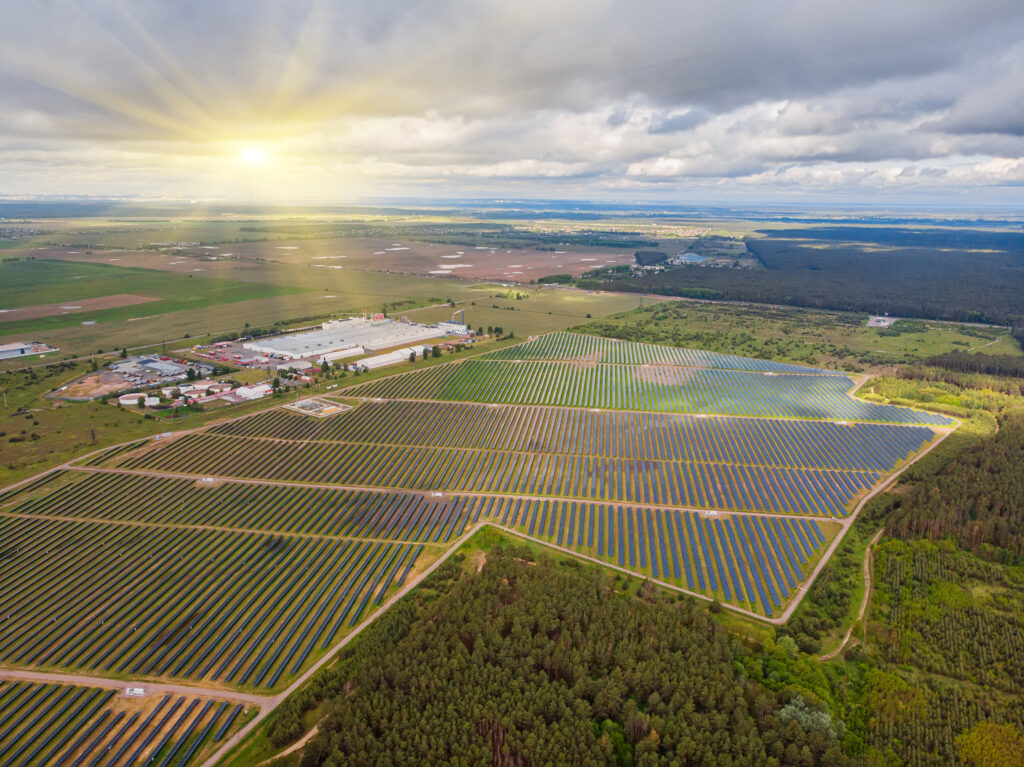India is moving rapidly on its path towards solar energy adoption, and a significant milestone has just been achieved. To strengthen this journey, we’re diving deep into the newly inaugurated NISE’s Solar PV Testing Facility. This advanced lab is set to boost India’s renewable energy mission by ensuring quality, reliability, and innovation in solar technology.
The new lab will set global benchmarks in solar R&D, testing, training, and policy support while marking a bold step towards self-reliance, innovation, and international excellence.”
— Shri Pralhad Joshi, Union Minister for New and Renewable Energy
An Advanced Solar Test Laboratory, or NISE’s Solar PV Testing Facility, was inaugurated by Union Minister Shri Prahlad Joshi. This PV module testing and calibration lab at the National Institute of Solar Energy (NISE) was inaugurated on 22 April 2025, marking the 55th Earth Day in Gwal Pahari, Bandhwari, Haryana. This benchmark facility will enhance the quality, reliability, and bankability of solar modules deployed nationwide. With the rapid shift towards renewable energy capacities, quality assurance has become more crucial than ever. Now, NISE is equipped to offer comprehensive services for photovoltaic modules and technologies.
The purpose of this advanced solar test laboratory is to redefine the standards for solar technology. These BIS standards will enhance the PLI (Production Linked Incentive) schemes. India is poised to set new global benchmarks in solar research, development, and quality assurance, marking a significant leap for India’s clean energy ambitions.
The Significance of New NISE’s Solar PV Testing Facility
This step has been taken by the government to boost domestic solar manufacturing and R&D under the Make in India initiative. This test lab will ensure that not only India’s solar future, but also the wider as well as good quality.
(i) Quality Assurance: Rigorous testing of solar panels for efficiency, durability, and performance under extreme conditions.
(ii) Global Benchmarking: Aligning Indian solar products with international standards to boost export competitiveness.
(iii) Consumer Trust: Providing manufacturers and buyers with certified, reliable data to inform purchasing decisions.

Cutting-Edge Capabilities of NISE’s Solar PV Testing Lab
According to the government, this lab will provide comprehensive testing and calibration services. This will bridge the gap between innovation and implementation, and also provide certification to establish the benchmark and market confidence.
NISE is a designated testing center for Bureau of Indian Standards (BIS) certification. A mandatory requirement for solar modules sold in India under the IS 14286, IS/IEC 61730, and IS/IEC 61215 standards.
Here are five core capabilities of this test lab apart-
Efficiency and Output Testing
This advanced solar facility assures accurate measurement of energy conservation efficiency. Because solar panels have to face different types of weather conditions, ranging from harsh to moderate temperatures, which affect panels’ energy outputs. The lab is accredited by the National Accreditation Board for Testing and Calibration Laboratories (NABL) as per ISO/IEC 17025. This will ensure the highest testing standards, and this will provide long-term system performance.
Longevity Stress Tests
Our government is aware of environmental stress, hence NISE has designed an advanced PV testing facility to reduce it within a short timeframe. The facility of accelerated aging chamber and these chambers expose solar PV modules to extreme temperatures cycles. Like high humidity, intense UV radiation, and mechanical stress, to replicate 25+ years of real-world conditions. This will also help to evalate the degradation rate, material stability and overall durability of panels in varied indian climatic conditions. In addition, it plays a pivotal role in certifying bankable, long-lasting solar technologies, directly supporting India’s renewable energy ambitions.
Thermal Performance Testing
Cutting-edge facilities conduct rigorous thermal performance analysis by focusing on environmental extremes across India, from the Himalayan cold zone to the heat of the Thar desert, to understand how panel efficiency fluctuates with critical temperature and identify thermal coefficient, heat dissipation capability, and potential hotspots.
Analyses efficiency losses in solar panels when exposed to temperatures ranging from −10°C to 50°C, replicating real-world thermal conditions.
AI-Driven Fault Detection
The technological advancement in machine learning will help you detect micro-cracks, hotspots, delamination, and subtle manufacturing defects in solar panels. Leverage trained AI models that work on a large dataset with thermal images, electroluminescence scans, and performance metrics. This predictive diagnostic capability improves quality assurance and manufacturing standards and helps forecast potential long-term failures, reducing downtime and maintenance costs in field-deployed systems.
Sustainability Audits
These audits evaluate the entire lifecycle environmental impact of solar PV components, including their carbon footprint, energy payback time, and recyclability. By analysing the sourcing of raw materials, manufacturing emissions, transportation, and end-of-life disposal or recovery options. NISE ensures that solar technologies align with India’s circular economy and green energy goals. It will encourage the adoption of low-impact, high-efficiency technologies across the solar value chain.
What’s in It for You? Benefits of Solar PV Certification by NISE.
The Indian government is trying to encourage local investors and manufacturers through this testing lab, which builds trust in investing in solar energy. The NISE certification provides quality assurance, performance, and reliability of solar products.
For Manufacturers & Developers
With hassle-free and streamlined testing protocols, manufacturers and developers accelerate their business growth with recognised certifications such as NISE, ISO, and GMP by allowing faster access to new markets that demand certified goods.
Cost Savings & Operational Efficiency
Inadequacy of operation weakness is crucial because it leads to lower operational cost, and early identification of product weaknesses during the certification process helps to optimise R&D and reduce costly recalls.
Competitive Edge & Brand Credibility
Certified goods boost brand reputation and customer trust and stand out by demonstrating compliance with international standards. NISE enables innovation and continuous improvement that will help you to stay ahead of the competition.
For Consumers & Businesses
There is an invisible hand at work between the consumer and the business; we can call it supply chain management, but everything depends on the relationship between them. The advanced testing lab will build a strong bond to overcome loopholes through NISE certification.
Transparency & Trust
Certification and transparent reporting empower customers to verify the product, which builds trust. Consumers confidently prefer brands that are open about product quality.
Long-Term Cost Savings
If you invest in high-quality and certified products like solar panels that can handle harsh weather conditions means fewer replacements and lower maintenance costs.
Empowered, Informed Choices
Now, consumer can access product details, such as through digital product passports, and their value-whether that’s durability, repairability, or environmental impact.

Haryana’s Green Energy Boost
This is not just a testing lab; it is the cornerstone of Haryana’s Vision to lead job creation and workforce development. In India’s clean energy revolution, over 500+ skilled professionals are being trained in engineering, data analytics, quality assurance, and sustainability through upskilling programs, hands-on training, and academic partnerships. The facility positions Haryana as a trusted partner for global solar manufacturers. It actively attracts foreign direct investment (FDI) from companies seeking compliant, high-quality Indian suppliers.
(i) Global partnership
(ii) Job creation
(iii) Start-up collaboration
India’s Bigger Picture
Our ambitious journey towards clean energy is a witness to concerns related to environmental changes. India is going to achieve 500kW of renewable energy by 2030, and this lab will support in achieving this ambitious goal. With NISE’s New Solar PV Testing Facility, India will ensure product efficiency and durability that maximizes ROI for projects nationwide. And this certification will play a crucial role in turning this vision into reality. It will also reduce material wastage through long-lasting panels and components and maximise ROI for both public sector and private sector projects. In addition, this is also beneficial for grid stability through quality benchmarks that will accelerate the adoption of clean energy. Ultimately, this initiative strengthens India’s global leadership in sustainable energy while fostering a cleaner, more resilient future for all.
